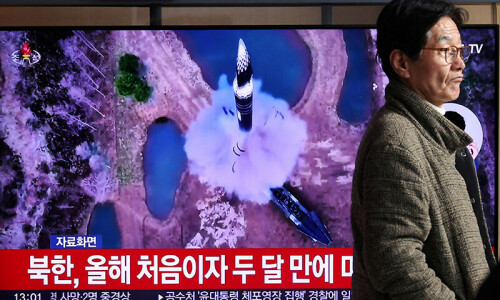 EVER since the international oil prices started their journey to often set records almost daily basis, policy makers and oil business have accepted it as a God-sent opportunity. While the consumers are severely hit by surging oil prices and its impact on rates of other commodities, oil refineries, marketing companies and the government earn unprecedented windfalls.
EVER since the international oil prices started their journey to often set records almost daily basis, policy makers and oil business have accepted it as a God-sent opportunity. While the consumers are severely hit by surging oil prices and its impact on rates of other commodities, oil refineries, marketing companies and the government earn unprecedented windfalls.
The fact that oil refineries, companies and dealers were direct beneficiaries of oil price bubble is understandable but even the newly-elected government has started to give an impression as if nothing could be done to protect the domestic consumer.
The oil-deficit economies are struggling hard to counter this price shock and oil companies and their shareholders are making fortunes everywhere. However, many governments and firms abroad started to think in terms of finding cheap alternatives to cope with the emerging situation. For example, some state governments in the United States introduced plans for cleaner fuel despite existing negligible tax rates on petroleum products and automobile companies rolled out smart cars, fuel-efficient vehicles and electric power engines.
Pakistan’s oil import bills surged to $11.4 billion in financial year 2007-08 against $7.3 billion in 2006-07, showing a substantial increase of more than 56 per cent. But so was the pressing need to do away with the faulty pricing mechanism and adopt innovative approaches to shore up depleting foreign exchange reserves, depreciating rupee and falling purchasing power of the large majority of the population.
Instead of doing away with the deemed duty on diesel and kerosene available to refineries and premiums on oil imports allowed to oil companies, the government increased the rate of general sales tax on almost all petroleum products in the budget 2008. These duties are in addition to GST, excise duty, dealer commission, company margin, ocean and evaporation losses, wharfage, insurance, banking costs and product handling charges that are inbuilt in the retail sale price.
As a result, the GST on motor spirit (petrol) increased by about 50 per cent to Rs10.44 from Rs7 per litre in four months. Likewise, the GST on HOBC (high octane blending component) increased by 47 per cent to Rs12.26 from Rs8.46 per litre since February 17. GST on kerosene oil also increased by 49 per cent to Rs6.86 from Rs4.60 per litre, while GST on light diesel oil surged by almost 60 per cent to Rs6.77 from Rs4.25 per litre in four months.
Similarly, because of higher international prices, the margins of dealers and oil companies and inland freight equalisation margin on motor spirit increased by 39 per cent, 40 per cent and 96 per cent respectively since February 17 this year. On HOBC, the margins of dealer and company increased by 50 per cent while the IFEM increased by 97 per cent in just four months. On kerosene oil, the IFEM and OMC’s margin increased by 76 per cent and 40 per cent respectively while IFEM and OMC margin went up by 41 per cent and 49 per cent respectively.
All these increases, translated into windfalls worth billions of rupees for oil companies, dealers and the government. Heavens would not have fallen had these rates been frozen at a reasonable rate to partially offset the negative impact of higher international rates to the consumer and the economy.
In fact, it would be prudent to examine if higher tax rates are more beneficial to the economy or the impact of lower tax rates, less overall production cost and better GDP growth before setting annual revenue targets. Higher tax rate on oil has a chain effect on almost everything and a lower rate could contain rising rate of inflation.
In addition, there is another unjustified charge of premium that is allowed to the oil companies and ranges between $20-32 per ton on petroleum products. The premiums were originally allowed in the regulated petroleum market as the government used to negotiate discounted prices with international oil suppliers for long-term uninterrupted supplies under guaranteed contracts.
If this premium on diesel at $28 per ton is withdrawn, the import parity price of diesel would come down to about Rs37-40 per litre against current sale price of about Rs50 per litre. That means that a major portion of subsidy on diesel and kerosene could be eliminated even after allowing reasonable dealer and company margin, GST, duties and other banking and product handling charges.
The government officials who have been dealing with the oil pricing know that withdrawal of 10 per cent deemed duty on diesel - that should not have been allowed to continue beyond 2002 in the first place – could reduce the import parity price by almost Rs10 per litre. Interestingly, only diesel and furnace oil are import products but premium and duties are applicable on almost all products. Technically, deemed duty is a replacement of customs duty on import which should not be legally charged on locally produced products.
The deemed duties were allowed at the time of oil price deregulation in 2001 for one year to provide funds to refineries to upgrade their products to European standards and increase their storages for improving country’s strategic oil reserves but without any tangible outcome as yet. After a lot of outcry, the then prime minister had directed the petroleum ministry to suggest a plan for gradual withdrawal of these duties. The ministry twice moved the plan for reduction in deemed duties but could not become part of the budget despite increasing consumer prices.
This pricing anomaly had caused more than Rs200 billion losses to the consumers in seven years and Pakistani refineries earned more than 300-400 per cent higher per share profit than their counterparts in Singapore and the Middle East. Also the profitability of various Pakistani refineries increased between 200-3100 per cent in seven years.
This is in addition to the inventory gains earned by the oil companies and refineries because of higher international prices. For example, the profit before tax and profit after tax of Pakistan State Oil Company increased by about 300 per cent to Rs13 billion and Rs8.5 billion respectively in first half of 2007-08 against Rs3.3 billion and Rs2.1 billion respectively.
Similarly, the National Refinery Limited earned a profit of about Rs3.3 billion in just three quarters of 2007-08 which was close to its full year profit of Rs3.7 billion in 2006-07. The financial results of other oil companies and refineries are even better. At the same time, the central board of revenue earned about Rs150 billion in sales tax and duties during financial year 2007-08 and the results for current year are expected to be even higher given the higher rate of GST and higher import prices.
The Oil and Gas Regulatory Authority (Ogra) has long been asking the government to change the variable mode of IFEM on oil products to a fix charge to make it more transparent to cover the transportation cost, rather than a source of profitability. The IFEM is currently calculated by the oil companies and is deemed as final by Ogra for the purpose of oil price calculation.
The IFEM system not only lacked transparency but involved a clear conflict of interest for the fact that private firms set a rate that directly benefits them. This role should be with an independent regulator, auditor or the government entity. Ogra has been suggesting that if the IFEM should be announced in advance for one year on historic basis and then adjusted at the end of the year on actual but independent audit basis.
The enormous financial impact of high oil prices demands that each and every item of the pricing mechanism be based on prudent economic cost, reasonable rate of tax and profitability and is not transparent but fair as well for the consumer, the investor and the economy. Estimates suggest that retail prices of some products would drop significantly and subsidy would stand eliminated in some others. But that requires political will and economic fairness.















































Dear visitor, the comments section is undergoing an overhaul and will return soon.